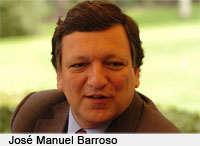Barroso calls for more work on HIV/AIDS
European Commission President José Manuel Barroso has called for more work to be done in the fight against HIV/AIDS by private business, especially in Eastern Europe, which has some of the highest rates of infection in the world, and in Africa, which has the bulk of cases. He was speaking at the Global Business Coalition on HIV/AIDS in London on 22 May. The event, which awarded prizes to the companies that have made a difference in the fight against HIV/AIDS, featured luminaries such as UK Foreign Secretary Margaret Beckett and Sir Elton John, alongside the Commission President. Mr Barroso compared the fight against HIV/AIDS to a cup with water in it - is that cup half full or half empty - are we winning the fight? Mr Barroso proposed that the glass is half full and that the fight can be won, but more work needs to be done. Part of that fight involves the search for treatments and vaccines. Mr Barroso outlined how the European Commission would back research into both treatments and perhaps more importantly, methods of preventing infection. 'As for Europe's pharmaceutical industry, it has devoted vast resources to providing more and better drugs for treatment. But new efforts should also be directed towards research on preventive technologies. The Commission is ready to support industry-led research on AIDS vaccines and microbicides. Strong guidance from pharmaceutical companies is vital if this is to bear fruit, and the Commission has already established partnerships with the Alliance for Microbicide Development, the Global HIV Vaccine Enterprise and, indeed, the Global Business Coalition itself,' he said. Mr Barroso paid tribute to the Global Fund to fight AIDS, TB and malaria, which is now five years old. 'The fund's success means its financial needs are increasing. But public donors cannot meet these needs alone. Additional financing will have to come mainly from new sources, including private donations. That's why increased support from you, the private sector, is essential,' he said. He praised the current Red campaign, coordinated by American Express, which will feed money into the Global Fund. This brought Mr Barroso to aid and trade. Although both are increasing, and the EU leads those increases, 'we can, we must do more. We must deliver on the promises we made. Let me highlight one area: trade. I worry about the body language surrounding the present Doha round. Some say it is wiser for the developing world to wait for something better in the future. I cannot agree,' he said. The President outlined how legislation in Europe had brokered the deal to provide antiretroviral medicines to African nations at close to cost process. 'The effect of this, and greater competition, has been dramatic. In 1999, a full course of antiviral treatment for a worker living with HIV cost USD 10,000 [7,800 euro] per year. In 2006, it costs USD 200 [156 euro] per year. Thanks to price decreases, 1.3 million patients are being treated in low and middle income countries today, compared to about 400,000 only three years ago,' he said. The scheme has proved such a success that Mr Barroso called on major pharmaceutical companies and exporters of medicines to apply tiered pricing as a general rule. 'In today's interconnected world, we can no longer ignore that AIDS has already killed 25 million people. The disease must be everyone's business and every company's responsibility,' said former US ambassador to the UN, Richard Holbrooke. 'The companies we are honouring tonight are making a difference. Their innovative ideas are proof that the business community has an invaluable role to play in the fight against AIDS.' The winners on the night were in six categories: - Unilever Tea Kenya, for its work to encourage zero-tolerance for stigma and discrimination in the workplace; - National Basketball Association for its community actions through its Basketball without Borders program scheme; - L'Oréal, through its programme to educate hairdressers worldwide, passing on safe sex practices to clients; - Merck & Co., Inc. in Botswana for its African Comprehensive HIV/AIDS Partnerships (ACHAP), which treats 52,000 people, co-funded through the Botswana government and the Gates foundation; - Xstrata Coal, for work in reducing the stigma attached to AIDS/HIV testing in South Africa; and - American Express for the RED campaign, which delivers 1 per cent of RED card holders spend to the Global Fund.



